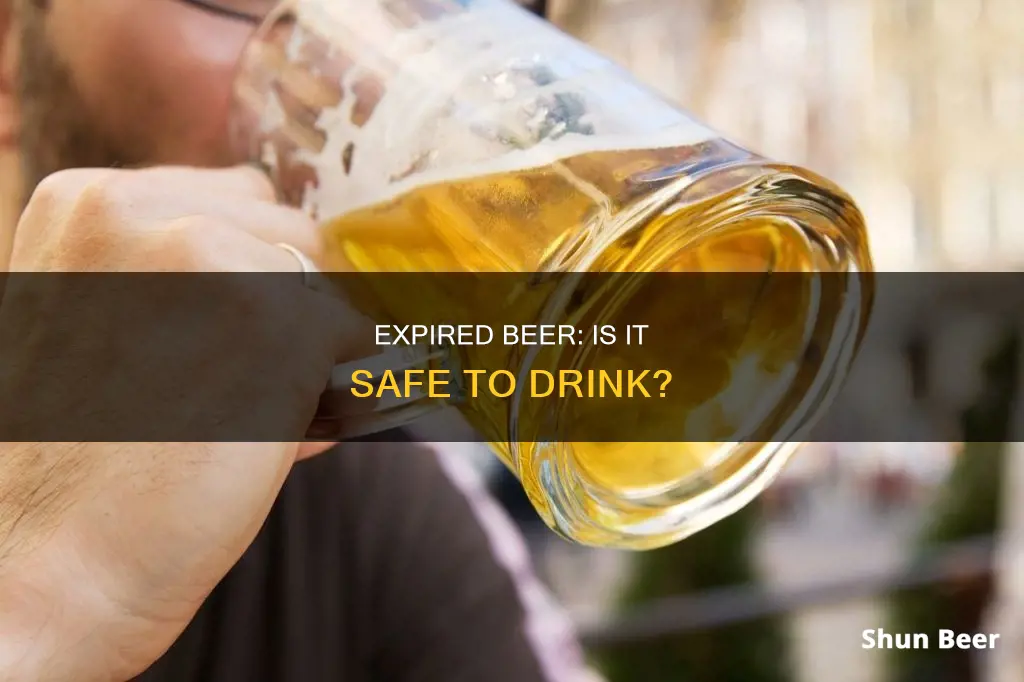
Beer is a beloved beverage for many, but what happens if you drink it past its expiration date? The short answer is that it's generally safe to consume, even if it's been sitting in your pantry for years. Beer has a best before date, indicating the time frame in which it's meant to be consumed for optimal freshness, rather than an expiration date that signifies it's no longer safe. While drinking expired beer won't make you sick, it might provide an unpleasant sensory experience. The taste of beer changes over time, and it can become flat, vinegary, or develop a skunky odour. Additionally, the appearance of fuzzy mould spots or coagulated proteins/yeast, referred to as beer floaties, are signs that your beer has gone bad and should be discarded.
| Characteristics | Values |
|---|---|
| Is expired beer unsafe to drink? | No, but it may taste bad. |
| Does beer have an expiration date? | Yes, but it's more of a "best before" date. |
| What happens if you drink expired beer? | It won't make you sick, but it may taste unpleasant. |
| How long does beer last beyond its expiration date? | At room temperature, it lasts 5-9 months. In a refrigerator, it can last 2-3 years. |
| Does unopened beer go bad? | Yes, unopened beer will eventually go bad, but it won't be unsafe to drink. |
| Can unopened beer grow mold? | No, unless there was an issue with the bottling or canning process. |
| How can you identify expired beer? | By checking the color, smell, taste, foam density, and overall appearance. |
| Can expired beer be used for cooking? | Yes, especially if the beer's unique qualities complement the dish. |
| Does beer stored in a refrigerator go bad? | Yes, but it will take much longer than beer stored at room temperature. |
| Does beer go bad in the heat? | Yes, heat causes beer to go bad more quickly. |
| Does canned beer go bad? | Yes, but usually more slowly than bottled beer due to less light exposure. |
| Does bottled beer go bad? | Yes, both dark and light bottles will go bad over time, but at different rates. Clear or light bottles can become "skunky" due to light exposure. |
What You'll Learn

Is expired beer unsafe to drink?
It's happened to the best of us. You find a long-lost can of beer at the back of the fridge or in a dark corner of the pantry. You pick it up, and there it is: the dreaded expiry date, long since passed. But is it safe to drink?
The Short Answer
Expired beer is generally safe to drink, even if it's been in the pantry for years. The fermentation process, low pH level, and alcohol and hops content make it difficult for harmful bacteria to thrive in beer. So, even if it's past its best, it's unlikely that expired beer will make you sick.
The Long Answer
While drinking expired beer is mostly safe, there are a few things to keep in mind. Firstly, the taste of the beer will likely have changed. Over time, the delicate flavours and aromas of beer break down, and new, less pleasant flavours can emerge. So, while it might be safe, it may not be a very pleasant drinking experience!
Secondly, while it's rare, there are some situations where expired beer can become unsafe. If the seal is broken, bacteria can get in, and the beer can spoil. This can happen if the beer has lost its fizz or has developed a vinegary taste. Mould can also grow in beer, especially if the bottle or can was dirty when packaged or if the seal is poor. If you see any signs of mould, it's best to throw the beer out.
How to Store Beer
To keep your beer fresh for as long as possible, it's best to store it in a cool, dark place, preferably the refrigerator. If you're storing at room temperature, keep it out of direct sunlight. It's also best to store beer upright, as this minimises its exposure to oxygen.
Beer doesn't last forever, even in ideal storage conditions. Most beers are best consumed within 6 to 9 months of purchase if stored at room temperature, or within 2 years if refrigerated. Unpasteurised or craft beers may have a shorter shelf life.
The Bottom Line
So, while it's generally safe to drink expired beer, it's not always a good idea. If you're concerned about the taste or see any signs of spoilage, it's probably best to pour it out and grab something fresher. After all, when it comes to beer, most would agree that taste is the most important part of the experience!
Beer and Surgery: Drinking Timeline and Safety Tips
You may want to see also

What causes beer to expire?
Beer does not technically expire, but it does go bad. This is because there are several factors that can cause the beer to spoil or "skunk", including light, oxygen, heat, and time.
Light
Hops are sensitive to UV radiation from the sun, which is why most beer bottles are tinted brown. Even if exposed to sunlight for under an hour, beer will undergo a chemical reaction that produces 3-methyl crotyl mercaptan, a compound that exudes a distinct skunky flavour.
Oxygen
Oxygen interacts with the compounds from malt, yeast, and hops, causing oxidation and a disappointing papery taste. Once a bottle or can of beer is opened, oxidation goes into hyperdrive, and if the beer is left out for long, it will be left with a pretty sad version of the beverage.
Heat
Heat speeds up oxidation, so storing beer in a refrigerator is an absolute must. Major changes in temperature, like from an ice-cold cooler to a sun-roasted car, make it even worse. Heat can easily lead to beer going bad rapidly, so it's vital that beer is stored at the proper temperature.
Time
Beer can't escape time, and neither can we. With most hoppy beers, flavour tends to dwindle after the three- to six-month mark, due to the fragility of its fresh ingredients and the factors mentioned above. On the other hand, bottle-conditioned beers with an ABV of 9% or higher will generally be fine if aged for over a year.
Non-Alcoholic Beer: Safe for Minors?
You may want to see also

How can you tell if beer has expired?
Beer typically has a best before date, rather than an expiration date. This means that it is still safe to drink after this date, but the flavour and quality may be degraded. However, there are some ways to tell if a beer has gone bad.
Firstly, if the beer has lost its fizz, this is a sign that the seal has been broken, and the beer will not taste as it should. If a beer has a vinegary taste, this is a sign that bacteria has gotten into the beer, and it should be thrown out.
Beers can also be affected by oxidation, which gives them a stale, papery taste. This is caused by oxygen interacting with the compounds from malt, yeast, and hops. This process is sped up by heat, so it's important to store beer in a cool place, preferably a refrigerator. Major changes in temperature can also affect the taste of beer, and this process cannot be reversed.
Finally, light exposure can cause beer to become "skunky". Hop compounds are especially sensitive to UV light, which causes a chemical reaction that gives off an unpleasant skunky taste. Beer is therefore typically packaged in dark bottles or aluminium cans, to block out light.
Beer and Type 2 Diabetes: What's the Verdict?
You may want to see also

How long does beer last in the fridge?
Beer does expire, but it doesn't pose the same risks as expired food. The alcohol content in beer and the presence of hops, which have antimicrobial characteristics, prevent pathogenic bacterial growth. So, even if you drink expired beer, the worst thing that will happen is that it will taste bad.
Beer has a longer shelf life when stored in the fridge. At room temperature, beer lasts about 5 to 9 months beyond the expiration date listed on the label. In a refrigerator, unopened beer can last up to two or three years. Opened beer has a shelf life of about a day or two, regardless of the expiration date.
The shelf life of beer varies depending on the type and storage conditions. Most beers are best consumed within 6 to 9 months if stored at room temperature. Refrigeration can extend this period to up to 2 years. Unpasteurized or craft beers may have a shorter shelf life.
The type of beer also affects its shelf life. Stronger beers, such as stouts, porters, and high-alcohol content beers, tend to last longer than lighter beers like lagers and pilsners. Beers with higher ABV (8% and above) like Stouts and Barleywines taste better with age. On the other hand, hoppy beers, like IPAs, are best consumed fresh to enjoy their full flavour and aroma. These beers gradually lose their flavour and aroma over time and are best drunk sooner rather than later.
To maintain the freshness of your beer, it is important to store it in a cool, dark place, away from temperature fluctuations. Keep it upright to minimize oxidation, and avoid exposing it to direct sunlight.
How to Drink Beer: The Head Conundrum
You may want to see also

What is the best way to store beer?
Beer is best stored in a cool, dark place, away from sunlight and temperature fluctuations. The ideal temperature range for storing beer is between 45 and 55 degrees Fahrenheit. If you're storing beer in a refrigerator, the temperature should be even lower, ideally between 50 and 55 degrees.
It's important to keep beer upright to minimize oxidation and avoid exposing it to direct sunlight. UV rays can cause a chemical reaction in the beer, breaking down its flavour components and causing it to smell and taste like skunk spray. This is why beer is often packaged in dark bottles or aluminium cans, which block out UV light.
If you're storing beer in a cellar or basement, it's crucial to maintain a consistent temperature, ideally around 10 degrees below the beer's fermentation temperature. Keep the beer in a dark place, away from direct sunlight, and minimise movement to avoid causing chemical changes that can affect its flavour.
For unopened beer, the storage method may vary depending on the type of beer and the packaging. Sealed bottles and cans can be stored in colder conditions than kegs or growlers. Kegs should be stored in a cool, dry space, away from other foods, to reduce any risk of contamination. Growlers are best stored upright in a cool, dark space, and their contents will remain fresh for several days.
For home-brewed beer, the storage container will also impact its shelf life. Glass bottles are affordable and easy to store, but they require labour-intensive sanitisation between brews. Kegs allow for more control over carbonation but take longer to prepare. During fermentation, home-brewed beer should be stored somewhere warm, then moved to a cooler location for drinking.
Overall, the key to storing beer is maintaining a cool, dark, and consistent environment, minimising exposure to oxygen, and keeping it away from direct sunlight to preserve its flavour and quality.
Beer and Fever: Is It Safe to Drink?
You may want to see also
Frequently asked questions
Yes, drinking expired beer is generally safe. Beer has "best before" dates, not "expiration dates". While the beer may not taste as good, it will likely be safe to drink.
Check the colour, smell, taste, foam density, and overall appearance of the beer. If the beer has lost its fizz, it's likely that the seal was broken and the beer has gone flat. If the beer has a vinegary taste, it's likely that bacteria have gotten in.
Beer lasts about 5 to 9 months beyond the expiration date listed on the label at room temperature. In a refrigerator, unopened beer can last up to two or three years. Opened beer has a shelf life of about a day, regardless of the expiration date.







